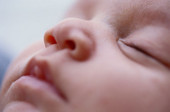
WEDNESDAY, Sept. 12 (HealthDay News) — While the whooping cough vaccine offers the best chance of protection against this potentially deadly disease, immunity provided by the vaccine appears to wane significantly every year after vaccination.
A new study found that protection against whooping cough (also known as pertussis) dropped by 40 percent a year after the fifth and final dose of vaccine.
“During the five years after the last dose of vaccine, protection from the disease wanes substantially each year,” explained study author Dr. Nicola Klein, co-director of the Kaiser Permanente Vaccine Study Center in Oakland, Calif. “If we estimate that after the fifth dose of vaccine, protection is at 95 percent, protection would decrease to 71 percent after five years.”
But, both Klein and Tom Clark, a medical epidemiologist with the U.S. Centers for Disease Control and Protection, pointed out that parents should still get their children vaccinated against pertussis.
“We want to make sure parents understand that even though the protection wears off more quickly, the vaccine shouldn’t be misconstrued as not being protective,” Clark explained. “Pertussis never went away, and it’s back now with a vengeance. And, this vaccine protects against severe disease and its complications.”
Results of the study are published in the Sept. 13 issue of the New England Journal of Medicine.
In 2010, almost 28,000 Americans had pertussis, according to the CDC. And, Clark says that number is likely an underestimation of the actual number of cases, because people with less serious cases don’t report them. Whooping cough is highly contagious, and is spread by coughing or sneezing. Babies are the ones hardest hit by this disease, and more than half of infected infants need to be hospitalized. Complications for infants may include pneumonia, seizures and even death, according to the CDC.
The vaccine for pertussis is given in a five-dose schedule during childhood. It’s given in combination with vaccines for diphtheria and tetanus. Doctors may refer to the vaccine as DTaP. The first three shots are given in infancy at 2, 4 and 6 months. The fourth shot is given between 15 and 18 months, and the fifth shot is generally given between the ages of 4 and 6 years, according to the CDC. The vaccine is also now recommended for pregnant women, with the hope that their immunization will help protect the baby as well.
In the early 1990s, the pertussis portion of the vaccine was changed from the live whole-cell vaccine to its current inactive acellular form. This change was made to reduce the number of side effects that occurred after vaccination, according to background information in the study.
In the current study, Klein and her colleagues reviewed data on 277 fully vaccinated children between the ages of 4 and 12 who had been diagnosed with pertussis through lab tests, and compared them to 3,318 fully vaccinated children in the same age range who tested negative for pertussis. The researchers also compared the group of children with known pertussis to a control group of 6,086 age-matched children who hadn’t been tested for pertussis.
They found that children who were diagnosed with pertussis were more likely to have received their last dose of pertussis vaccine earlier compared to the two control groups.
As children got older, the risk of pertussis increased. Among 6-year-olds, the rate of whooping cough was 4.5 percent. For 8-year-olds, that number was 12.2 percent, and 18.5 percent of 10-year-olds tested positive for pertussis.
None of the children in the study who had been vaccinated had severe pertussis and there were no hospitalizations or deaths from the disease, indicating that the vaccine did offer some protection, even in those who got ill.
In children who were old enough to have received at least some doses of the whole-cell vaccine, the rates of pertussis were significantly lower, according to the study.
“Clearly, there are differences between the whole-cell vaccine and the acellular vaccine. The immune response doesn’t seem to be as much, but it’s a balancing act between enduring protection and side effects,” Klein said. “The older vaccine seemed to have more enduring protection, but at a cost.”
She said the current recommendations are for 11- to 12-year olds to get a booster vaccine. What isn’t yet clear, she said, is if additional booster shots will be needed as children who only received the acellular vaccine get older. Klein said that reformulating the current vaccine, or developing a new one may need to be considered.
Clark said the CDC recommends a booster for adolescents, as well as for adults. Clark said the coverage rates in adults are very low, less than 10 percent. He said it’s particularly important for young adults considering starting a family, because the disease is most serious in infants.
More information
Learn more about the whooping cough vaccine from the U.S. Centers for Disease Control and Prevention.

